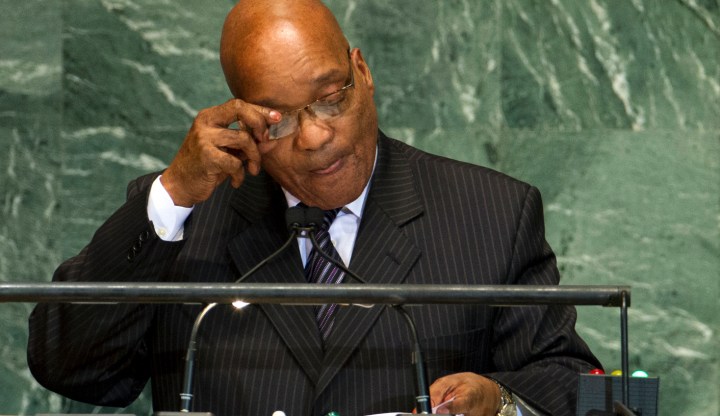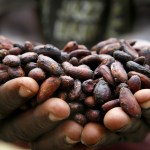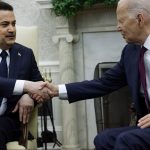World
Jacob Zuma at the UN: “Crisis? What crisis?”

Jacob Zuma spoke to the world’s most powerful people on the world’s biggest stage on Monday. It’s just a pity that, having travelled all the way to the United Nations in New York, he left his head buried in the sand. By SIMON ALLISON.
South Africa’s standing in the world has rarely been lower. The euphoria of the World Cup has been all but forgotten as international media have latched onto the Marikana massacre, not unreasonably using the incident to symbolize a long catalogue of failures: police brutality, corporate greed, labour unrest, corrupt politicians, huge social inequality and the dearth of basic services.
This is not the whole story. Here in South Africa, we know that. We know about our modern cities and slick road network. We know about the growing black middle class, and the improvements in basic services since the Apartheid days. We know about our country’s remarkable capacity for tolerance and reconciliation. We know that, contrary to international impressions, we can walk our streets without bullet-proof vests. We know that Marikana, while it grieves and concerns us greatly, is not symptomatic of our whole society.
This is what the rest of the world needs to be told. It’s not the job of international media to do so, but it is certainly the job of our head of state and first representative, President Jacob Zuma. And what better time than to do this than in his address to all the world’s assembled leaders and media at the United Nations General Assembly? This, surely, would be exactly the right moment to explain that Marikana was a one-off, that our country will get through this, that we are still a good bet for investment and tourism.
Speaking on Tuesday, a pin stripe-suited Zuma got off to a good start: “Your Excellencies and Your Majesties, Distinguished Delegates and guests,” he began.
It went downhill from there. In a speech that was over 2,000 words long, Zuma managed to touch on the plight of Western Sahara, the dangers of colonialism and the need for a nuclear-free zone in the Middle East without once mentioning Marikana, miners or labour unrest. As far as our president is concerned, South Africa has no explaining to do.
The high point of his address was a stinging attack on the United Nations Security Council.
“We have seen a divided Security Council unable to muster the collective courage to say ‘no more’ to warring parties in the interest of peace,” he said. “Given its mandate, the Council has to be legitimate, democratic and transparent. Its current composition has a propensity for deadlock and paralysis even in the face of crisis. It remains un-representative and undemocratic in both its composition and decision making.”
These are strong words, especially as South Africa is currently one of the Council’s non-permanent members.
Pointing out the astonishing statistic that 70 percent of the Council’s work is Africa-related, Zuma called for two permanent seats to be reserved for African countries, and five non-permanent seats.
Currently, there are just three non-permanent seats reserved for African countries, and no African countries have veto power.
Zuma’s argument about the need for UN reform is perfectly valid, and strongly supported by other African states, but his case is somewhat diluted by his obvious self-interest. Who better to occupy one of those permanent seats – if reform happens, chances are there will only be one – than South Africa? There’s no doubt that we want the position, and our diplomats are lobbying furiously for it, mindful that Nigeria are also strong contenders.
Zuma, however, couldn’t resist a few barbs at the expense of other Council members, mindful perhaps of the criticism South Africa received last year over its handling of Libya and Cote D’Ivoire. One such dig – aimed at countries which use international law principles to “justify regime change” – was clearly directed at the United States, which used concepts such as the Responsibility to Protect to justify the invasion of Iraq; and France, which did the same for the interventions in Libya and Cote D’Ivoire. Given that both of these countries wield veto power on the Security Council – and can therefore block any reform – this was perhaps not the most diplomatic thing Zuma could have said.
Zuma concluded his moment in the UN spotlight by telling his audience that peace is a choice, and that it is achievable.
- “The wise and brave choices that we have the power to make can deliver lasting peace to every corner of the world,” he said.
- By choosing to overlook the most important issue on South Africa’s political agenda – Marikana – at the biggest world stage, it seems that Zuma has ignored his own advice.DM
- Full text of Zuma’s speech at the 67th United Nations General Assembly website
Photo: South Africa’s President Jacob Zuma addresses the 67th session of the United Nations General Assembly at UN headquarters in New York, September 25, 2012. REUTERS/Ray Stubblebine

















 Become an Insider
Become an Insider